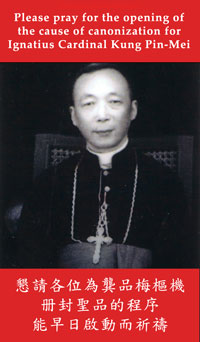The Persecution of the Underground Roman Catholic Church in China
Testimony of Joseph M. C. Kung, President
November 18, 2006
![]()
The Cardinal Kung Foundation
presented to The Congressional-Executive Commission on China
Room 2255 Rayburn House Building, Independence Avenue & South Capitol Street, S.W Washington, D.C
![]()
Ladies and Gentlemen:
Two and a half years ago on March 25, 2002, I testified to this committee about the persecution of underground Roman Catholic Church in China. I testified at that time that the persecution of religious believers had never stopped regardless of the fact that China had made significant economic progress and that China had joined World Trade Organization. I also testified two years ago that many arrests and tortures of underground Roman Catholic bishops, priests, nuns, and lay persons had taken place, ranging from an 82-year-old priest to a 12-year-old girl. I also reported the complete destruction of a shrine of the Blessed Mother in Dong Lu in Hebei by 5,000 Chinese soldiers in May 1996 and the destruction of hundreds of churches. I talked about the disappearance of Bishop Su Zhimin after his arrest in October 1997 and the disappearance of Bishop An Shuxin after his arrest in May 1996. We discussed the difference between the Patriotic Association and the underground Roman Catholic Church. We highlighted that a Holy Mass, a prayer service, and even praying over the dying by an underground Roman Catholic were considered illegal and subversive activities by the Chinese government punishable by exorbitant fines, detention, house arrests, jails, labor camps, or even death. We also discussed how the Chinese government forced underground Roman Catholics to register with the Patriotic Association. Refusing to do so would result in being sentenced to three years' labor camp. Being ordained an underground Roman Catholic priest was also considered a crime punishable by three years in the labor camp. You may find all this information in your congressional record dated March 25, 2002.
I regret to inform you that I do not have any good news for you today. The arrests and atrocities that I reported to you two years ago continue unabated during the past two years. For instance, churches are still being destroyed. Random arrests of religious and other faithful are still being made.
A Roman Catholic church was demolished by the Chinese government on June 21, 2003 in Liu Gou Village in Heibei. The building of this church was completed only two weeks beforehand. One church in the Fujian province was torn down three times because the faithful refused to join the Patriotic Association. Since 1999, 27 churches were destroyed in the archdiocese of Fuzhou in the Fujian province.
Bishop Peter Fan, who was the Bishop of Baoding in Hebei for approximately 41 years, was pronounced dead in jail on April 13, 1992. He was tortured to death at the age of 85. He spent all 41 years as a bishop under surveillance, custody, detention, and arrest in prison or in labor camps. Reuter reported: "There was a large bruise on the right side of the man's face. The bones of his legs appeared to be broken. The two legs were tied so tightly together with white cloth that it was difficult to untie them. There was obviously something they wanted to hide."
In his 2002 China trip, US President George W. Bush urged Jiang Zemin to free Bishop John Gao Kexian from prison. Instead, Bishop Gao, 76, a reserved and timid man, died two and one-half months ago in an unknown prison in northern China in August 2004 after 5 years in a prison. His remains were sent to his relatives at the end of August, 2004 without any explanations. He joins the ranks of the martyred who gave their lives for Christ in China. (Asia News 9/12/04)
Bishop SU Zhimin and Bishop AN Shuxin are still missing. We still do not know if they are now dead or alive.
Bishop Su is a prominent leader of the underground Roman Catholic Church. He had been arrested at least five times, and spent approximately 28 years in prison thus far. He was beaten in prison so savagely that he suffered extensive loss of hearing. He met with Congressman Christopher Smith in January 1994 and was arrested and detained for 9 days immediately after the departure of Congressman Smith. He was arrested again later, and escaped from prison and remained in hiding from April 1996 to October 1997. He was rearrested in October 1997. While in hiding, Bishop Sue wrote to the Standing Committee of the People's National Congress. He asked it "to thoroughly investigate the serious unlawful encroachment on the citizen's rights, and to administer corrective measures to restore order and control to ensure that the civil rights and interests of the vast number of religion believers are protected." Bishop SU was seen only once when he was accidentally discovered on November 15, 2003 while he was hospitalized in a Baoding hospital. Once the Chinese government realized that Bishop Su was discovered, he was taken away immediately without a trace.
Bishop AN was in labor camp from November 1982 to October 1985. He was arrested several times from 1985 to 1993. He was last arrested in May 1996 and was only seen once when he was allowed to visit his mother a few years ago. He has not been seen ever since.
Underground bishops are routinely rounded up during the major feast days such as Christmas and Easter or even during a visit by certain foreign personnel. They are routinely taken away forcibly to a hotel for a few days in order to be separated from their congregations so that they could not celebrate the Holy Mass during the important feast days or they could not meet with these foreign visitors. Often, adding insult to injury, the bishops are forced to pay for the hotel and meal expenses, including for those government officials who watched over them. This could amount to a large sum of money that the bishops simply cannot afford. Besides Bishop Su and Bishop AN, many other bishops have been arrested. The attached prisoner list could give you some idea that almost every one of the underground Roman Catholic bishops is either arrested in jail, or under house arrest, or under strict surveillance, or in hiding.
The violent and widespread arrests of underground Roman Catholic religious and faithful continue unabated. On August 6 this year, eight priests and two seminarians were arrested in the Hebei province while they were attending a religious retreat. Approximately 20 police vehicles and a large number of security personnel conducted a house to house search in order to arrest these priests and seminarians. There are now at least twenty-six underground religious in various jails at this time in the Hebei province alone. The Vatican issued a strong denunciation of religious repression in China because of this arrest. The Pope's spokesman, Joaquin Navarro-Valls, criticized China when he said: "We find ourselves once again faced with a grave violation of freedom of religion, which is a fundamental right of man." On May 16 this year, two priests, Father LU Genjun and Father CHENG Xiaoli, were arrested in Hebei just before they were to start classes for natural family planning and moral theology courses. A dozen priests and seminarians were attending a religious retreat on October 20, 2003 in a small village in Hebei. They were all arrested. On July 1, 2003, 5 priests were arrested on their way to visit another priest, Father LU Genjun, who was released from labor camp after serving there for three years. Another priest, Father LU Xiaozhou, was arrested on June 16, 2003 when he was preparing to administer the Sacrament of Anointing of the Sick to a dying Catholic. These are just few examples of the arrests since my testimony two years ago.
Sometimes a religious is arrested for flimsy reasons. The government official would then ask for a "fine" which could be negotiated for the amount in order to release the prisoner. Often, the "fine" is paid quietly without any receipt, and the religious is released. These incidents have been orally reported to me a number of times. They are of course without any written evidence. A priest was arrested in Wenzhou in Zhejiang province because he printed religious hymns. He was arrested in 1999 and sentenced in 2000 to 6 years in prison with a fine of JMP 270,000 equivalent to approximately US$33,750! Bishops and other religious continue to be forced to attend a government-sponsored religious conference to propagate the three autonomies principles (Self apostolate, self finance, and self administer) of the Patriotic Association, thereby forcing or attempting to force the underground Church personnel to join the Patriotic Association by threats and by treats. The catechism is not allowed to be taught to young children under 16 years old. Underground seminaries are considered illegal and are not allowed to be established.
Upon learning that I was going to testify to this committee, an underground bishop requested me to give you two messages:
- Since 1949 when the communists took over China, literally tens of thousands of Roman Catholic bishops, priests, and other faithful have been arrested. They were put in jail for 10, 20, 30, or even 40 years. Many of them died in jail. One of them was Bishop Joseph FAN Xueyan, whom I had reported above. Many of them were released after a very long period. Some of those released, such as Ignatius Cardinal Kung, have since died. Some of them are still living. It does not matter to the government if they are dead or still living; they are still considered criminals because their "criminal" charges were never erased by the government. This bishop in China respectfully requested this committee to convey the plea to the administration that, while negotiating with the Chinese government for religious freedom, the United States government propose that these prisoners, both living and dead, be officially and posthumously exonerated of so called crimes of which the Chinese government falsely accused them five decades ago. In doing so, the reputation of these living and dead religious prisoners of conscience can be restored in China. Those who are still living can at least once again enjoy equal treatment in the society.
- The people of China love and yearn for true freedom of religion. Again, the bishop wonders if the United States government could continue to negotiate with the Chinese government so that i) the faithful in China do not have to fear that they could get arrested during their religious activities, ii) their churches would not be destroyed after they labored so hard to build them, and iii) all those imprisoned religious and other faithful would be released. The bishop believes that the freedom that President Bush has committed to promote all over the world during his election campaign has to include religious freedom. Pope John Paul II has said that religious freedom is the most basic form of all freedom. This Chinese underground bishop therefore hopes that through the direct request from President Bush to the highest authority of the Chinese government, true religious freedom might be granted to the Chinese people. The bishop wants the highest authority in China to know about these atrocious acts of persecution of people of religious faith in the hope that, having realized these atrocities, the government will wake up to correct and eliminate this persecution.
Thank you.




